The British Invasion.
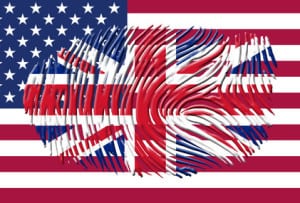 The United States and Britain have enjoyed (or endured) a ‘Special Relationship’ for a long time. After that Revolutionary War nastiness, we have pretty much remained ‘two nations separated by a common language’, and on the subject of War, we usually end up on the same side. During the sixties, however, there was a lot of social turmoil in the air. The post-WWII economic boom had put money in people’s pockets; new technologies (like cheap air travel and telecommunications) were changing people’s lifestyles; and people’s personal aspirations were growing and expanding. Especially young people’s.
The United States and Britain have enjoyed (or endured) a ‘Special Relationship’ for a long time. After that Revolutionary War nastiness, we have pretty much remained ‘two nations separated by a common language’, and on the subject of War, we usually end up on the same side. During the sixties, however, there was a lot of social turmoil in the air. The post-WWII economic boom had put money in people’s pockets; new technologies (like cheap air travel and telecommunications) were changing people’s lifestyles; and people’s personal aspirations were growing and expanding. Especially young people’s.
“….. the music died.”
Rumblings in the old country.
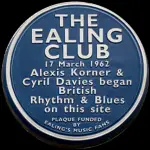 Over in Britain, something big was hatching. Big Bill Broonzy had made a couple of tours there in the mid-50s, and bandleader Chris Barber often invited Blues stars like Muddy Waters, Sister Rosetta Tharpe and Sonny Terry & Brownie McGhee to play with his band. This exposure to imported American Blues had ground-shifting effects. A generation of young musicians and fans saw the power of this music, and began importing and sharing important Blues records by previously unknown players. Two of Chris Barber’s side-men, Alexis Korner and Cyril Davies formed Britain’s first Blues band, Blues Incorporated, and in 1962 they opened The Ealing Club in West London, which is acknowledged as the birthplace of British R&B.
Over in Britain, something big was hatching. Big Bill Broonzy had made a couple of tours there in the mid-50s, and bandleader Chris Barber often invited Blues stars like Muddy Waters, Sister Rosetta Tharpe and Sonny Terry & Brownie McGhee to play with his band. This exposure to imported American Blues had ground-shifting effects. A generation of young musicians and fans saw the power of this music, and began importing and sharing important Blues records by previously unknown players. Two of Chris Barber’s side-men, Alexis Korner and Cyril Davies formed Britain’s first Blues band, Blues Incorporated, and in 1962 they opened The Ealing Club in West London, which is acknowledged as the birthplace of British R&B. 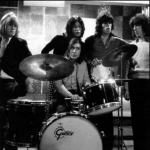 The Rolling Stones first met up there, and got their first gig deputising at The Marquee Club for Blues Incorporated. The audience in those early days, when they also held ‘open-mic’ sessions, included Rod Stewart, John Mayall, all of Cream, Elton John, Eric Burdon, Long John Baldry, Paul Jones and Manfred Mann and dozens more who would go on make their mark. They were all digging this new music that spoke to the soul, and they were desperate to play it themselves. That was a real possibility, because ‘skiffle’, which came out of the Folk scene, encouraged young players to get up and have a go, sometimes with improvised instruments like jug-bands used to. Future legends like John Lennon, Van Morrison and Jimmy Page were already honing their skills in the back-rooms of regional and suburban pubs!
The Rolling Stones first met up there, and got their first gig deputising at The Marquee Club for Blues Incorporated. The audience in those early days, when they also held ‘open-mic’ sessions, included Rod Stewart, John Mayall, all of Cream, Elton John, Eric Burdon, Long John Baldry, Paul Jones and Manfred Mann and dozens more who would go on make their mark. They were all digging this new music that spoke to the soul, and they were desperate to play it themselves. That was a real possibility, because ‘skiffle’, which came out of the Folk scene, encouraged young players to get up and have a go, sometimes with improvised instruments like jug-bands used to. Future legends like John Lennon, Van Morrison and Jimmy Page were already honing their skills in the back-rooms of regional and suburban pubs!
The Mersey Beat.
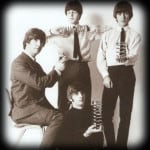 Meanwhile, up in Liverpool, bands formed on an almost weekly basis to play in venues that were springing up around the city. Merchant sailors in this busy sea-port returned from The States with thousands of R&B records, and the bands performing their cover versions would soon be writing their own songs. It is no accident that The Beatles early recordings included their versions of ‘Kansas City’, Chuck’s ‘Roll Over Beethoven’ and The Isley Brothers’ ‘Twist and Shout’. Similarly, The Stones’ first chart record was Chuck’s ‘Come On’, and they took Howlin’ Wolf‘s classic 12-bar Blues ‘Little Red Rooster’ to the top of the singles charts in the UK (but couldn’t get it released in America).
Meanwhile, up in Liverpool, bands formed on an almost weekly basis to play in venues that were springing up around the city. Merchant sailors in this busy sea-port returned from The States with thousands of R&B records, and the bands performing their cover versions would soon be writing their own songs. It is no accident that The Beatles early recordings included their versions of ‘Kansas City’, Chuck’s ‘Roll Over Beethoven’ and The Isley Brothers’ ‘Twist and Shout’. Similarly, The Stones’ first chart record was Chuck’s ‘Come On’, and they took Howlin’ Wolf‘s classic 12-bar Blues ‘Little Red Rooster’ to the top of the singles charts in the UK (but couldn’t get it released in America).
Blues from the Heart.
The British Invasion.
The funeral of President Kennedy in late November 1963 is often noted as the first shared national American TV ‘moment’. Arguably, the appearance of The Beatles of The Ed Sullivan Show in front of 70m. viewers barely ten weeks later was the second. Their music, their clothes, their irreverend attitude and their effect on girls “…kicked out all the Bobbys”, as Jerry Lee put it, and opened the door for ‘The British Invasion’. Soon The Beatles were followed by The Zombies, Herman’s Hermits, The Kinks, The Searchers, Donovan, The Animals, The Yardbirds and The Stones. Many of these were entertainers, exploiting the sudden popularity of the British in America, but these last three had deeper roots. The Animals and Yardbirds had served some time playing behind American Blues stars like Rice ‘Sonny Boy II’ Miller, who was living in London, and the Blues legends who had begun touring Europe to enthusiastic new audiences. The Beatles and those pop bands helped open the door for African-American music in its own backyard, but The Stones kicked that door off its hinges!
“It all opened up then.”
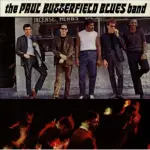 The Stones were booked to play on the network TV show Shindig, but made it a condition that Howlin’ Wolf had to play too. Recording the show with the first Black Bluesman to feature on the networks, they sat around his feet like adoring kids, just in case anyone hadn’t noticed who their hero was! They went to Chess Studios in Chicago and met Muddy Waters, then recorded their No.1 single ‘It’s All Over Now’ there. Every time they were interviewed on TV, radio and in the press, Keef would talk about the records by Muddy, Wolf, Jimmy Reed and T-Bone Walker that inspired the Stones music. This, in turn, inspired young America to look at its own musical heritage. As BB King put it, “It all opened up then.” In the South, the search for the ‘originators of the Blues‘ gathered pace, as more gigging and recording opportunities came along. Blues players who hadn’t seen the inside of a studio for years were making records; writers who never got paid for their songs back in the day were getting royalty checks for all those new cover versions; they were all getting bigger, better-paid gigs; international tours were organised, and The American Blues Festival touring extravaganza became an annual event. In Chicago, Blues bands like Paul Butterfield‘s and Charlie Musselwhite‘s crossed the race line and made albums that are considered ‘classics’ even today, and everywhere youth music gained a new vitality.
The Stones were booked to play on the network TV show Shindig, but made it a condition that Howlin’ Wolf had to play too. Recording the show with the first Black Bluesman to feature on the networks, they sat around his feet like adoring kids, just in case anyone hadn’t noticed who their hero was! They went to Chess Studios in Chicago and met Muddy Waters, then recorded their No.1 single ‘It’s All Over Now’ there. Every time they were interviewed on TV, radio and in the press, Keef would talk about the records by Muddy, Wolf, Jimmy Reed and T-Bone Walker that inspired the Stones music. This, in turn, inspired young America to look at its own musical heritage. As BB King put it, “It all opened up then.” In the South, the search for the ‘originators of the Blues‘ gathered pace, as more gigging and recording opportunities came along. Blues players who hadn’t seen the inside of a studio for years were making records; writers who never got paid for their songs back in the day were getting royalty checks for all those new cover versions; they were all getting bigger, better-paid gigs; international tours were organised, and The American Blues Festival touring extravaganza became an annual event. In Chicago, Blues bands like Paul Butterfield‘s and Charlie Musselwhite‘s crossed the race line and made albums that are considered ‘classics’ even today, and everywhere youth music gained a new vitality.
Times they were a’changing.
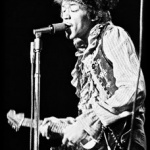 The summer of 1967 is remembered as ‘The Summer of Love.’Less than four years after the start of the British Invasion, the Monterey Pop Festival was perhaps the indicator that music had become a global industry when Indian sitar maestro Ravi Shankar and The Who shared the bill with Otis Redding, Jimi Hendrix, Janis Joplin & Big Brother, and Jefferson Airplane. Sadly, The Stones, The Kinks and Donovan all had drug/visa problems or the transatlantic balance might have been more equal. The album and film of this festival gained world distribution, and was perhaps the start of a new era of social history in the States and elsewhere, and youth music stood at a crossroads. The huge changes in The States during the mid-sixties certainly wouldn’t have sounded the same if The Beatles and The Stones and those other ‘British Invaders’ hadn’t reminded America what rich cultural treasures lay in those little-known neighbourhoods across the tracks.
The summer of 1967 is remembered as ‘The Summer of Love.’Less than four years after the start of the British Invasion, the Monterey Pop Festival was perhaps the indicator that music had become a global industry when Indian sitar maestro Ravi Shankar and The Who shared the bill with Otis Redding, Jimi Hendrix, Janis Joplin & Big Brother, and Jefferson Airplane. Sadly, The Stones, The Kinks and Donovan all had drug/visa problems or the transatlantic balance might have been more equal. The album and film of this festival gained world distribution, and was perhaps the start of a new era of social history in the States and elsewhere, and youth music stood at a crossroads. The huge changes in The States during the mid-sixties certainly wouldn’t have sounded the same if The Beatles and The Stones and those other ‘British Invaders’ hadn’t reminded America what rich cultural treasures lay in those little-known neighbourhoods across the tracks.
